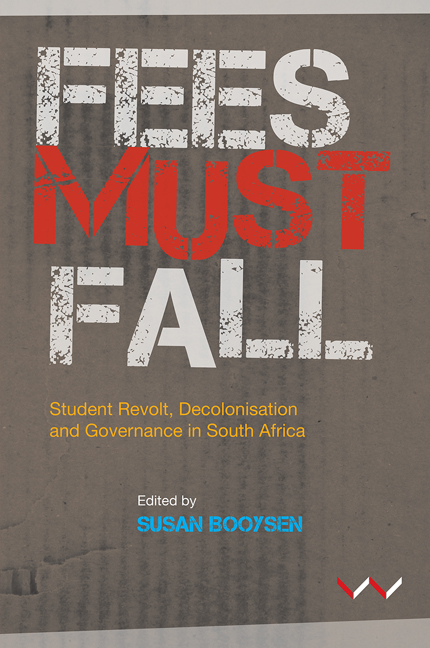Book contents
- Frontmatter
- Contents
- Acknowledgements
- Preface
- Introduction
- PART ONE POWER REDEFINED – ‘WHAT HAPPENED TO GOVERNANCE?’
- PART TWO PRIMARY VOICES – ‘THE ROOTS OF THE REVOLUTION’
- Chapter 2 The roots of the revolution
- Chapter 3 The game's the same: ‘MustFall’ moves to Euro-America
- Chapter 4 #OutsourcingMustFall through the eyes of workers
- Chapter 5 Documenting the revolution
- PART THREE THE REVOLT – ‘RISING AGAINST THE LIBERATORS’, SOUTH AFRICA IN AFRICA
- PART FOUR POWER AND CLASS REDEFINED – ‘SIT DOWN AND LISTEN TO US’
- PART FIVE JUSTICE, IDENTITY, FORCE AND RIGHTS – ‘WE CAME FOR THE REFUND’
- APPENDICES
- Contributors
- Index
Chapter 5 - Documenting the revolution
from PART TWO - PRIMARY VOICES – ‘THE ROOTS OF THE REVOLUTION’
Published online by Cambridge University Press: 20 April 2018
- Frontmatter
- Contents
- Acknowledgements
- Preface
- Introduction
- PART ONE POWER REDEFINED – ‘WHAT HAPPENED TO GOVERNANCE?’
- PART TWO PRIMARY VOICES – ‘THE ROOTS OF THE REVOLUTION’
- Chapter 2 The roots of the revolution
- Chapter 3 The game's the same: ‘MustFall’ moves to Euro-America
- Chapter 4 #OutsourcingMustFall through the eyes of workers
- Chapter 5 Documenting the revolution
- PART THREE THE REVOLT – ‘RISING AGAINST THE LIBERATORS’, SOUTH AFRICA IN AFRICA
- PART FOUR POWER AND CLASS REDEFINED – ‘SIT DOWN AND LISTEN TO US’
- PART FIVE JUSTICE, IDENTITY, FORCE AND RIGHTS – ‘WE CAME FOR THE REFUND’
- APPENDICES
- Contributors
- Index
Summary
INTRODUCTION
‘A way of looking at the world that creates a space in which dialogue and contestation are truly possible, in which new ways are constantly explored and created, accepted and rejected, and in which change is unpredictable, but the idea of change is constant.’ This is how the former chief justice, Pius Langa (2006), described transformative constitutionalism. Such ideas of dialogue, change and contestation apply equally to transformation battles on university campuses, and this chapter will describe some of the different forms which the dialogue took, chiefly on the campus of the University of the Witwatersrand (Wits).
The three student authors of this chapter, Refiloe Lepere, Swankie Mafoko and Ayabonga Nase, were all involved in different ways in the 2015 protests at Wits: producing plays on the Wits Great Hall steps, marching, occupying and providing legal assistance to University of Johannesburg (UJ) workers and students. The chapter therefore offers a medley of voices, combining academic discussion of protest in South Africa and elsewhere with insider elucidation, viewpoints and theoretical references.
The emphasis is on documents, from the fleeting (such as a student play performed only once) to the permanent, such as the Memorandum of Understanding (MoU) signed between Wits management, workers and students (2015). Protests cannot be understood by relying on written documents alone. This is because so much communication takes place beyond the printed word, and because some crucial issues cannot be communicated in formal documents.
Students demanded decolonisation of all aspects of the university (see also Chapters 2 to 4 in this volume). Their protest sought change in tuition costs, university governance, curriculum and the character and content of teaching. The student challenge to the way universities in South Africa currently operate was not limited to university interactions with students, but included the wellbeing of the workers on campus, particularly outsourced workers.
As well as demanding social transformation, the students challenged the manner in which words and symbols become documents of protest, using new media, performances and other artefacts in making meaning of historical events such as the protest. ‘The mobilisation of words can actually change how people act collectively,’ argues Sidney Tarrow, who studies social movements.
Information
- Type
- Chapter
- Information
- Fees Must FallStudent revolt, decolonisation and governance in South Africa, pp. 101 - 124Publisher: Wits University PressPrint publication year: 2016
